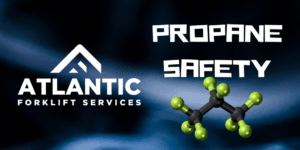 More than half a million forklifts in the US operate on propane gas. That’s a lot of gas, and a lot of potentially dangerous situations if the propane is not handled properly.
More than half a million forklifts in the US operate on propane gas. That’s a lot of gas, and a lot of potentially dangerous situations if the propane is not handled properly.
Here’s what you need to know about propane:
Propane, by itself (like natural gas that we use to heat our homes) is odorless. Propane’s distinct odor is added to the gas in the processing to make it easier to identify a leak.
The gas is stored in the tank under pressure, and is flammable when it is mixed with air, making leaks particularly dangerous. It can be ignited by open flame, and even sparks from static electricity. In addition, propane is heavier than air, meaning it doesn’t dissipate easily and can accumulate in pockets and small spaces. This is a large reason why propane leaks can be so dangerous.
If, while operating a forklift, you smell “rotten eggs” stop the forklift immediately. Make sure the area you are in is well-ventilated, and turn off the lift’s propane tank.
Once you have ventilated the area you are in, turn the propane tank on again. Sometimes you can hear a propane leak, but most often checking the tank and fittings with soapy water can easily identify leaks- you’ll see bubbles at the source of the leak.
Be aware that coming in contact with a propane leak can cause frostbite.
If the leak is at the fittings and valves, check their seating, they may need to be adjusted.
In the event the leak is on the cylinder itself, that cylinder must be discarded properly. Never dispose of a propane tank in the trash- there will be programs in your area that manage safe and proper disposal of tanks.
If you have questions about propane gas, your forklift, and your facility don’t hesitate to ask our experts, we can walk you through any situation safely, and securely.
